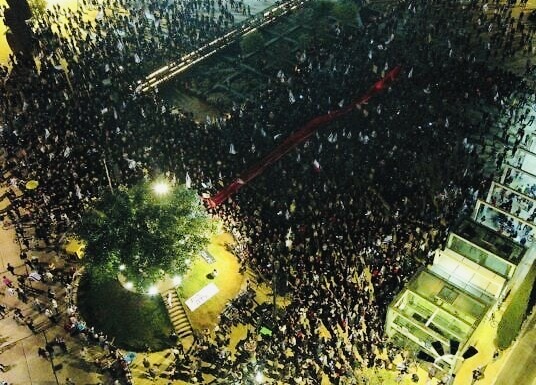Benjamin Netanyahu’s attempt to fire Ronen Bar, the director of the Shin Bet internal intelligence agency, discredits the Israeli prime minister, leaving him open to legitimate concerns that he values political survival more than democracy and the rule of law.
At the behest of Netanyahu, the cabinet voted on March 20 to dismiss Bar, a year before his term of office was officially due to end. Netanyahu said he had lost trust in Bar, who was appointed by Naftali Bennett, one of Netanyahu’s predecessors, in 2021.
To no one’s surprise, the cabinet’s decision set off alarm bells, partly because Bar was the first Shin Bet director to be sacked.
The attorney general, Gali Baharav-Miara, said that Bar’s dismissal was invalid on procedural grounds because it had not been approved in advance by an advisory committee on senior appointments.
The Supreme Court suspended his sacking, following a petition jointly filed by three political parties from the center, left and right, Yesh Atid, The Democrats and Israel Beytenu.
A separate petition was presented by the Movement for Quality Government in Israel.
All the petitioners expressed concern that Netanyahu, Israel’s longest-serving premier, had used his executive powers to subvert the Israeli democratic system for his own ends.

Bar, in a written affidavit submitted to the Supreme Court, fleshed out this theme. He argued that his dismissal stemmed not from professional considerations, but from “an expectation of personal loyalty on my part toward the prime minister.”
Bar’s claims, although hotly disputed by Netanyahu, are plausible.
He accused Netanyahu of having demanded personal loyalty from him over Supreme Court rulings in the event of a constitutional crisis. He explained that the Shin Bet’s professionalism and independence would have been compromised had he acceded to Netanyahu’s demand.
Bar disclosed that Netanyahu pressured him to spy on Israeli citizens who have funded and spearheaded anti-government protests prioritizing the release of Hamas’ hostages over defeating Hamas in the protracted war in the Gaza Strip.
Bar said he refused to sign a document, drafted by Netanyahu or his aides, that would have postponed Netanyahu’s current trial on the basis of false security reasons. Several years ago, Netanyahu was indicted on corruption charges of bribery, fraud and breach of trust. Netanyahu denies any wrongdoing, saying he is the victim of a “witch hunt.”
In addition, Bar infuriated Netanyahu because he called for a state commission of inquiry concerning the massive intelligence failures on October 7, 2023. That was the day when Hamas terrorists stormed into southern Israel in an unprecedented rampage, resulting in the deaths of about 1,200 people and the abduction of 251 Israelis and foreign nationals.
Netanyahu, who bears ultimate responsibility for that attack, has declined to form such a commission. By contrast, Bar has acknowledged his shortcomings and promised to resign next month.
Finally, Netanyahu is reportedly furious with Bar over his decision to open two investigations that could potentially embarrass him and undermine his coalition government.

The first probe deals with allegations that an aide leaked highly classified documents to a foreign publication. The second one revolves around suspicions that Netanyahu’s media advisors accepted payments from a representative of Qatar, an Arab state that has been in the forefront of hostage negotiations and releases. The government of Qatar denies these allegations.
Bar’s affidavit is potentially explosive and could enmesh the Israeli government in a crisis about the nature and future of governance and democracy in Israel.
As parliamentary opposition leader Yair Lapid said the other day, the incriminating material that Bar has brought to light raises serious questions as to whether Netanyahu is fit to be prime minister.
